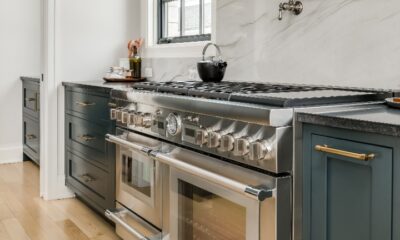
Shutterstock
When it comes to home improvements, it’s easy to be tempted by the idea of luxurious upgrades and trendy renovations. However, not all of these changes actually add value to your home—some can end up costing a lot without offering much in return. Before you start your next project, it’s important to know which upgrades are worth the investment and which ones aren’t.
Making informed choices can save you from spending money on improvements that won’t pay off. Let’s take a look at some common home improvements that often don’t deliver the results you expect.
Over-the-Top Landscaping

Shutterstock
Investing heavily in elaborate landscaping might seem like a good way to enhance your home’s curb appeal, but it can be a waste of money. High-maintenance gardens and exotic plants require constant care and may deter potential buyers who prefer low-maintenance options. Additionally, these expensive features might not hold up well over time, leading to costly upkeep. When selling, the new owner may not share your enthusiasm for elaborate outdoor spaces, making it a poor investment.
Luxury Bathrooms

Shutterstock
Upgrading a bathroom with high-end features like whirlpool tubs, heated floors, and custom tiling can lead to over-customization, which may not appeal to many buyers. These luxurious additions often come with increased energy costs and ongoing maintenance that potential buyers might not want to take on. The installation expenses frequently outweigh the return on investment, making such upgrades less effective for boosting property value. Instead, opting for clean, functional, and moderately updated bathrooms is a better choice to attract a wider audience.
Brand New Swimming Pools

Shutterstock
Adding a swimming pool to your home is a significant investment, but it doesn’t always pay off in terms of resale value. While a pool can be a fun feature for some, many buyers see it as a burden due to the high maintenance costs and safety concerns, especially in areas with short swimming seasons. In some regions, a pool can even lower your home’s value, as it may be viewed as more of a liability than an asset. Before taking the plunge, consider the preferences of your local market and the ongoing costs associated with pool ownership.
Home Office Renovations

iStock
Converting a room into a high-end home office with custom built-ins, specialized lighting, and state-of-the-art technology might seem like a good idea, especially in the age of remote work. However, the needs for a home office vary greatly among potential buyers, and what works for you may not appeal to others. A fully customized office space might not add as much value as you expect, as buyers might not be willing to pay a premium for your specific setup. Instead, focus on creating a versatile space that can easily be adapted to different uses, making it more appealing to a wider range of buyers.
Sunrooms

Shutterstock
Adding a sunroom to your home can be an attractive way to increase living space, but it’s often an expensive endeavor that doesn’t add as much value as homeowners anticipate. The cost of construction, insulation, and proper climate control can quickly add up, often exceeding the amount you can recoup when selling. Additionally, sunrooms can be difficult to heat and cool efficiently, leading to higher energy bills. Instead of investing in a sunroom, consider less costly ways to enhance your home’s natural light, such as adding larger windows or skylights.
Extensive Basement Finishing

Shutterstock
Finishing a basement can provide additional living space, but going overboard with high-end finishes and custom designs may not be the best use of your money. Basement spaces are often valued less than above-ground rooms, meaning that the return on investment might not justify the cost of luxury finishes. Potential buyers might prefer a simple, functional basement that they can customize to their own tastes and needs. By focusing on creating a clean, usable space with basic finishes, you can enhance your home’s appeal without overspending.
Garage Conversions

Shutterstock
Converting a garage into a living space or another type of room might seem like a smart way to add square footage to your home, but it can be a costly mistake. Many buyers prioritize having a secure place to park their cars and store tools, bikes, or other belongings over the extra interior space. This type of conversion can also reduce the overall storage options in your home, which is a key selling point for many potential buyers. To maximize your home’s appeal, keep the garage functional and consider other ways to improve the living space.
High-End Kitchen Upgrades

Shutterstock
The kitchen is often considered the heart of the home, but splurging on top-of-the-line appliances, custom cabinetry, and exotic countertops can be a poor investment. While a beautiful kitchen can attract buyers, the most expensive upgrades don’t always yield a proportional increase in resale value. In many cases, buyers may prefer to update the kitchen to their taste rather than pay a premium for your luxury choices. To get the most out of your kitchen renovation, focus on modern, functional, and cost-effective improvements that appeal to a broader audience.
Custom Closet Installations

Shutterstock
Installing custom closets with specialized features such as built-in shoe racks, jewelry drawers, and automated lighting can be very expensive. While these additions may seem attractive and convenient, not all buyers will appreciate or be willing to pay extra for them. Many people prefer to organize their storage space according to their own needs and might find your custom setup limiting. Instead, opt for simple, flexible storage solutions that can be easily adapted by future homeowners.
Wine Cellars

Shutterstock
Building a wine cellar in your home may sound luxurious and sophisticated, but it’s a niche improvement that appeals to a small segment of buyers. The cost of proper temperature control, insulation, and custom shelving can be significant, and most buyers won’t pay extra for a feature they might never use. Additionally, wine cellars require regular maintenance to keep them functioning properly, which can be a deterrent for those not interested in wine collecting. If you’re looking to invest in your home’s value, consider more universally appealing upgrades instead.
Home Theaters

Shutterstock
A dedicated home theater room might be a dream for movie enthusiasts, but it can be a poor investment when considering the resale value of your home. The technology used in home theaters changes rapidly, meaning what’s cutting-edge today might be outdated in just a few years. Additionally, not all buyers want or need a home theater, so it might not be the selling point you anticipate. Instead of a single-purpose room, consider creating a multi-functional media space that can be easily adapted for different uses.
Extensive Smart Home Systems

Shutterstock
Investing in a comprehensive smart home system with custom automation, high-end controls, and integrated gadgets might seem like a way to modernize your home, but it’s not always a wise financial decision. Technology evolves quickly, and these systems can become obsolete or incompatible with newer devices within a few years. Buyers might not appreciate the same gadgets or may prefer to install their own smart home features tailored to their needs. Instead, focus on installing basic, universally appealing smart features such as thermostats and security systems that enhance your home’s functionality without overspending.
Luxury Flooring

Shutterstock
Opting for high-end flooring materials like marble, exotic hardwoods, or intricate tile designs can significantly raise the expenses of a home renovation. Although these materials can add an element of luxury to your home, they don’t always translate to a substantial boost in resale value. Many potential buyers might favor more practical and durable flooring options that are not overly stylized. Furthermore, the ongoing maintenance costs associated with luxury flooring can be steep, making it a less attractive option for budget-conscious homeowners.
Room Additions

Shutterstock
Adding extra rooms to your home, such as an additional bedroom or bathroom, can be an appealing way to increase living space, but it’s often a costly endeavor that doesn’t always yield a high return on investment. The cost per square foot for an addition typically exceeds what buyers are willing to pay, especially if the added space doesn’t serve a necessary function. Instead of expanding your home’s footprint, consider optimizing existing spaces to improve functionality and flow. A well-organized home with clever storage solutions can be more appealing to buyers than extra, unnecessary rooms that increase your home’s maintenance costs.
Expensive Exterior Finishes

Shutterstock
Opting for expensive exterior finishes, such as custom brickwork, imported stone, or high-end siding, can dramatically increase the cost of a home renovation project. While these materials may add some curb appeal and set your home apart from others in the neighborhood, the high cost often isn’t recouped at resale. Most buyers prioritize a solid, well-maintained exterior over luxury finishes, which can also be difficult and expensive to maintain over time. To get the most value, choose simple, durable exterior materials that offer both aesthetic appeal and long-term durability.
Extensive Plumbing Upgrades

Shutterstock
Upgrading your home’s plumbing with high-end fixtures, complex water systems, or custom installations may seem like a good way to modernize your home, but it’s often unnecessary. Most buyers are satisfied with functional, reliable plumbing rather than luxury touches like gold-plated faucets or complex water filtration systems. These upgrades rarely add significant value to a home, and the cost of installation and maintenance can be high. Instead of splurging on unnecessary plumbing upgrades, invest in essential repairs and updates that ensure your home’s plumbing is up-to-date and functioning properly.
High-End Roof Replacement

Shutterstock
Replacing your roof is often a necessary maintenance task, but opting for top-of-the-line materials such as slate, copper, or custom tiles might not be the best financial decision. While these materials can add a touch of luxury and durability, most buyers are content with a durable, well-installed roof made from standard materials like asphalt shingles. The extra expense for luxury roofing materials is not typically reflected in resale value, meaning you might not recoup the costs when selling your home. A standard roof replacement with quality materials is often the most cost-effective option, ensuring both durability and appeal.
Unnecessary Energy-Efficient Upgrades

Shutterstock
While energy efficiency is an important consideration for many homeowners, investing in expensive upgrades such as solar panels, high-end insulation, or advanced heating and cooling systems might not always pay off. These investments often have long payback periods, and the initial costs can be substantial, making it difficult to see a significant return on investment. Additionally, buyers might not appreciate or be willing to pay for these upgrades, especially if they don’t align with their personal energy goals. Instead, focus on more modest energy-efficient improvements that offer a quicker return on investment, such as upgrading to energy-efficient windows or installing a programmable thermostat.
Elaborate Security Systems

Shutterstock
Investing in an elaborate security system with multiple cameras, alarms, and automated features might seem like a good way to protect your home, but it’s not always a wise financial decision. Most buyers are satisfied with basic security measures such as strong locks, a simple alarm system, and motion-sensor lights. Complex security systems can be seen as a hassle to manage, and the ongoing costs for monitoring and maintenance might deter potential buyers. To appeal to a broader audience, keep your security measures simple, functional, and easy to use.
Custom-Built Decks

Shutterstock
Building a large, custom-designed deck with high-end materials such as exotic woods, intricate railings, or built-in features can be a costly project that doesn’t always pay off. While outdoor living space is appealing to many buyers, not all will appreciate or be willing to pay extra for a custom deck. The high maintenance costs associated with such features can also be a deterrent, as they require regular upkeep to remain in good condition. A simple, well-maintained deck built with quality materials is often a better investment, providing outdoor space that appeals to a wide range of buyers.
Extensive Window Replacements

Shutterstock
Replacing windows with the latest high-tech, energy-efficient models can be an expensive undertaking that might not deliver the return on investment you expect. While energy savings are appealing, the cost of new windows often outweighs the benefits, particularly if the current windows are still in good condition. Most buyers are satisfied with standard double-pane windows that offer decent insulation and durability. Instead of replacing all your windows, consider necessary repairs or upgrading only those windows that are truly in need of replacement.
Custom Paint Jobs

Shutterstock
Custom paint job with high-end finishes, intricate designs, or specialty colors might seem like a way to make your home stand out, but it’s often a waste of money. While it can enhance your home’s appearance, paint is one of the easiest and most cost-effective changes for new homeowners to make. Not all buyers will share your taste, and they might not be willing to pay extra for a paint job they plan to change. To appeal to the broadest audience, stick to simple, high-quality paint in popular, neutral colors that can easily be customized.
Luxury Appliances

Shutterstock
Installing the latest luxury appliances in your kitchen or laundry room might seem like a great way to attract buyers, but it’s a costly investment that doesn’t always pay off. Many buyers are happy with standard, reliable appliances that get the job done, and they won’t necessarily pay extra for high-end brands. Technology also evolves quickly, so today’s luxury appliances could be outdated by the time you sell your home. Instead of splurging on top-of-the-line models, opt for durable, mid-range appliances that offer good performance and are widely appreciated.
Personalized Decor

Shutterstock
Adding personalized decor, such as custom murals, unique light fixtures, or bold color schemes, can make your home feel special to you, but it might not appeal to potential buyers. What’s meaningful and beautiful to you could be seen as an eyesore or a project for others. Custom decor can also be expensive to remove or replace, which could deter buyers who want a move-in-ready home. To maximize your home’s appeal, stick to classic, neutral decor that allows buyers to envision themselves in the space without needing to make immediate changes.
Unnecessary Garage Upgrades

Shutterstock
Spending money on upgrading your garage with luxury features like custom flooring, built-in cabinetry, or heating might seem like a way to enhance your home, but it’s often unnecessary. Most buyers are looking for a functional, clean space to park their cars and store their belongings, and they won’t pay extra for high-end features they don’t need. Additionally, luxury garage upgrades don’t typically add significant value to your home, meaning you’re unlikely to recoup the costs when selling. Instead, focus on maintaining a tidy, well-organized garage that meets the basic needs of most buyers.
Conclusion

Shutterstock
By focusing on projects that truly add value, you can avoid costly mistakes and make sure your investments pay off. It’s important to make smart, informed decisions that fit your goals, whether you’re planning to sell soon or just want to enjoy your home more. Choosing the right improvements can save you from future regrets and keep your home looking and feeling its best. Remember, sometimes the simplest changes make the biggest difference.



















































